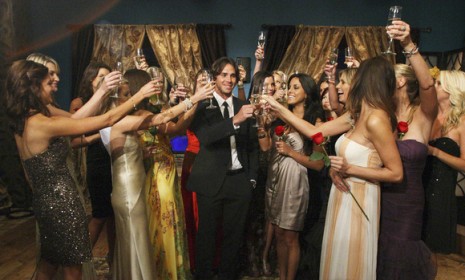The Bachelor's 'shocking' racial discrimination lawsuit: A guide
Two African-American men are filing a class action lawsuit against the producers of the ABC series for its longstanding failure to cast a non-white bachelor

A free daily email with the biggest news stories of the day – and the best features from TheWeek.com
You are now subscribed
Your newsletter sign-up was successful
In the combined 23 seasons of ABC's reality TV dating shows The Bachelor and The Bachelorette — which follow one bachelor or bachelorette on his or her search for a soulmate — there has never been a man or woman of color handing out roses to potential mates. Fed up with what they argue is racial discrimination, two African-American men who once auditioned for The Bachelor are filing a "shocking" class action lawsuit against ABC. Do they have a solid case? Here, a brief guide to the suit:
How do these shows work?
The Bachelor, which debuted on ABC in 2002, presents a single, supposedly eligible bachelor with a pool of possible romantic matches from which to choose a wife. Week after week, the women compete for his affection. At the end of every episode, the bachelor presents those who still appeal to him with a rose. The rest are sent home, and the process continues until the bachelor proposes to the woman of his dreams. The hit show is currently in its 16th season, while there have been seven seasons of spin-off The Bachelorette, which launched in 2003.
The Week
Escape your echo chamber. Get the facts behind the news, plus analysis from multiple perspectives.

Sign up for The Week's Free Newsletters
From our morning news briefing to a weekly Good News Newsletter, get the best of The Week delivered directly to your inbox.
From our morning news briefing to a weekly Good News Newsletter, get the best of The Week delivered directly to your inbox.
What are the grounds for the lawsuit?
Nathaniel Claybrooks and Christopher Johnson, two African-American football players from Nashville, have filed a class action lawsuit against ABC, executive producer Mike Fleiss, and the shows' production companies on behalf of "all persons of color who have applied for the role of The Bachelor or The Bachelorette but have been denied equal opportunity for selection on the basis of race." Claybrooks and Johnson say that when they attended an open casting call for The Bachelor in Nashville, they were "taken to the side of the room and left out of the normal audition process," according to TMZ. They believe they were mistreated because of their race.
Do these shows have a race problem?
Claybrooks and Johnson aren't the first ones to notice the shows' race issue. In a 2010 The Huffington Post article, Scott Harris asked, "Why is The Bachelor so white?" He called the show out for featuring only white bachelors and bachelorettes, and for having "a startling homogeneous" candidate pool as well. The ABC franchise's color problem looks even worse when compared to rival-network reality shows like Survivor and The Amazing Race, which feature largely diverse casts. ABC "continues to underserve America's ever-growing minority population," Harris said. Other analysts have flat-out called The Bachelor's "lily white" casting "racist."
A free daily email with the biggest news stories of the day – and the best features from TheWeek.com
What has ABC said?
The network has yet to comment on the new lawsuit. However, in 2011 producer Mike Fleiss gave a controversial response when asked whether the franchise would ever have a non-white bachelor or bachelorette. First, he hedged, "I think [former bachelorette] Ashley is 1/16th Cherokee Indian, but I cannot confirm." Then he expounded on why he has failed to cast people of color: "We really tried, but sometimes we feel guilty of tokenism. Oh, we have to wedge African-American chicks in there!" Such responses reflect disturbingly "flip thinking," says Alyssa Rosenberg at Think Progress.
Do the two men have a case?
Claybrooks and Johnson's lawyers must prove that race is a factor in the actual casting process. The fact that there has never been a non-white bachelor or bachelorette won't be enough, attorney Glen Rothstein tells The Hollywood Reporter. They would need to uncover documentation such as contestant applications, internal memos, or production emails to support their claim. "The entertainment industry isn't known for being politically correct in terms of its emails," attorney Andrew H. Friedman tells Entertainment Weekly. If lawyers are able to obtain proof, this case could be groundbreaking.
Sources: Culture Map, Entertainment Weekly (2), Hollywood Reporter, Huff. Post (2), Star-Ledger, Think Progress, TMZ
-
 Health insurance: Premiums soar as ACA subsidies end
Health insurance: Premiums soar as ACA subsidies endFeature 1.4 million people have dropped coverage
-
 Anthropic: AI triggers the ‘SaaSpocalypse’
Anthropic: AI triggers the ‘SaaSpocalypse’Feature A grim reaper for software services?
-
 NIH director Bhattacharya tapped as acting CDC head
NIH director Bhattacharya tapped as acting CDC headSpeed Read Jay Bhattacharya, a critic of the CDC’s Covid-19 response, will now lead the Centers for Disease Control and Prevention